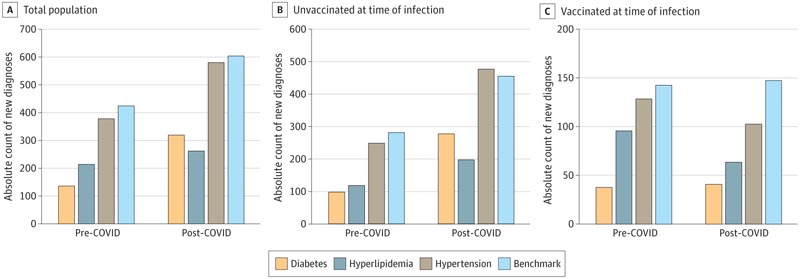In the early phases of the COVID-19 pandemic, people who recovered from the infection were at increased risk of new-onset cardiometabolic diseases , such as diabetes, hypertension, and hyperlipidemia. In the current pandemic phase, dominated by less virulent Omicron variants, it is unclear whether the risks of cardiometabolic disease after COVID-19 infection persist or have attenuated and whether vaccination status is associated with these risks.
Methods
This large cohort study of adult patients with 1 or more COVID-19 infections treated at Cedars-Sinai Health System in Los Angeles, California, from March 2020 to June 2022, used the International Classification of Diseases, Ninth Revision and the International Statistical Classification of Diseases and Related Diseases. Health Problems, Tenth Revision codes to identify cardiometabolic diagnoses (hypertension, hyperlipidemia, and diabetes) recently reported before or after a patient’s first COVID-19 infection.
A self-controlled exposure crossover design was used to estimate probabilities of a new cardiometabolic diagnosis occurring 90 days after versus 90 days before COVID-19 infection. To account for temporal confounding factors arising from disruptions in healthcare use during the pandemic, we compared the odds of a new cardiometabolic diagnosis with those of a new reference diagnosis (i.e., urinary tract infection and gastroesophageal reflux), which represents a marker of commitment to medical care unrelated to COVID-19.
In multivariable logistic regression models, we estimated the odds ratio (OR) for a new cardiometabolic diagnosis versus a new baseline diagnosis occurring 90 days after infection versus before, adjusting for age, sex, timing of infection (before the emergence of the Omicron variant) and COVID-19 vaccination status . The study was approved by the Cedars Sinai Medical Center Institutional Review Board, which waived the requirement for informed consent given the retrospective nature of the study. We follow the STROBE reporting guideline.
Data were analyzed using R, version 4.2.1 (R Foundation for Statistical Computing). The threshold for statistical significance was 2-tailed p < 0.05.
Results
The cohort of 23,709 patients (mean [SD] age, 47.4 [19.3] years) included 12,706 women (54%) and 10,981 men (46%) (22 patients of unknown sex) with 1 or more infections. because of COVID. Rates of diabetes, hypertension, hyperlipidemia, and new-onset baseline diagnoses that occurred within 90 days after COVID-19 infection were higher than before infection (Figure).
The highest odds after infection were for diabetes (2.35; 95% CI, 1.94-2.89; P < .001), followed by high blood pressure (1.54; 95% CI, 1 .35-1.76; P < .001), reference diagnoses (1.42; 95% CI, 1.25-1.61; p < .001), and hyperlipidemia (1.22; 95% CI, 1. 03-1.47; p = 0.03).
In multivariable-adjusted models, the risk of diagnosis of new-onset diabetes (vs. baseline) occurring before or after COVID-19 infection was significantly elevated (OR, 1.58; 95% CI, 1 .24-2.02; P < 0.001); however, the risks of hypertension and hyperlipidemia versus the reference diagnoses were not. Although the risk of diabetes after infection was higher among unvaccinated patients (OR, 1.78; 95% CI, 1.35-2.37; P < .001) than in vaccinated patients (OR, 1. 07; 95% CI, 0.64-1.77; P = .80), the interaction term between vaccination status and diabetes diagnosis was not statistically significant (OR, 0.59; 95% CI, 0.34- 1.06; P = .08).
There was no evidence of interaction by age, sex, or preexisting cardiovascular risk factors, including hypertension or hyperlipidemia. Age, sex, and timing of index infection with respect to the Omicron variant were not associated with an increased risk of a new cardiometabolic diagnosis before or after COVID-19 infection in any model.

The frequency of new diagnoses (diabetes, hyperlipidemia, hypertension and baseline conditions) occurring 90 days before and after COVID-19 infection is shown as colored bars in the overall cohort of 23709 patients (A), in the subset of 14,856 patients who were not vaccinated before infection (B), and in the subset of 8,853 patients who were vaccinated before infection (C).
Discussion
In this cohort study, COVID-19 infection was associated with an increased risk of diabetes , consistent findings from a meta-analysis. Our results suggest that this risk persisted as the Omicron variant became predominant, and the association held even after accounting for temporal confounders. The risk of diabetes after COVID-19 infection was higher in unvaccinated than vaccinated patients , suggesting a benefit of vaccination. The mechanisms contributing to the risk of diabetes following infection remain unclear, although persistent inflammation contributing to insulin resistance is one proposed pathway.
Limitations of the study include reliance on diagnostic coding, unaccounted for confounders (infection severity indices), and insufficient sample size and statistical power to test multiple interactions. Additional studies are needed to understand the cardiometabolic sequelae of COVID-19 and whether COVID-19 vaccination attenuates the risk of cardiometabolic disease.
















